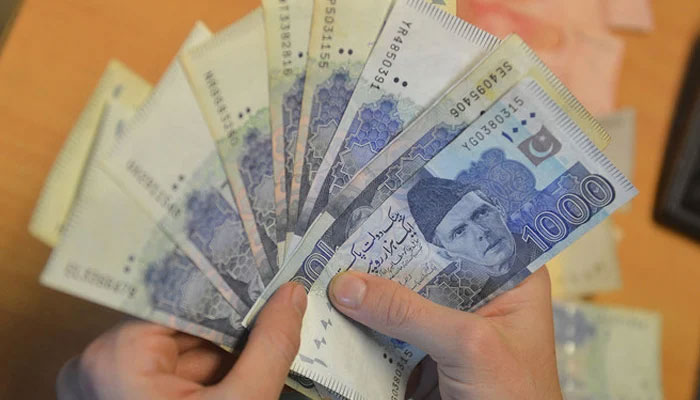T-bills attract $69.2m in September
KARACHI: Foreign investors poured $69.2 million in Pakistan’s short-term government debt securities in September, taking advantage of carry trades, the central bank data showed on Thursday.
Pakistan’s market has become an attractive destination for foreign investors due to improving growth prospects, stable currency, falling inflation, and better returns on local currency bonds and notes investments. In addition, the start of a fresh loan programme from the International Monetary Fund (IMF) would help stabilize the economy even more and draw in more foreign capital. Pakistan received $1.03 billion from the IMF as the first tranche of a $7 billion bailout last week.
There was an outflow of $7.6 million from the Market Treasury Bills in September. Despite this, the country received a net dollar inflow of $61.6 million into T-bills last month. These inflows reached $400 million in the fiscal year 2025. Investors withdrew $225 million worth of investment from the short-term papers in the current fiscal year.
Analysts said the interest rate differential led to a pickup in dollar inflows into the local debt market.“A significant portion of these inflows has been directed toward market treasury bills, which are providing foreign investors with an interest rate differential of approximately 1,200 basis points (bps) in this carry trade,” Awais Ashraf, director research at AKD Securities Limited.
“Strategists in developed markets are promoting carry trades that capitalize on the additional income from higher-yielding currencies and bonds, especially in stable markets where the risk of volatile price fluctuations eroding profits is lower,” Ashraf added.
“We anticipate that these inflows will continue to target Pakistan due to a yield differential exceeding 900bps, alongside increased currency stability following the country’s entry into the IMF programme and sound fiscal policies,” he said.
Even though the yield on Pakistani T-bills is decreasing and the six-month paper yields stand at 14.398 percent, foreign investors find Pakistani bonds appealing due to the US Federal Reserve’s recent interest rate reduction and the lower returns offered by developed economies compared to Pakistani securities.
“Under the ongoing IMF programme, several initiatives are being implemented to strengthen the economy, with early signs of stability already visible. Inflation has eased, the foreign exchange rate remains stable, and the country’s foreign exchange reserves have improved,” said Chase Securities in a note.
“Treasury yields have dropped significantly in both auctions and the secondary market, reflecting growing investor confidence. A fiscal pact has been signed between the federal and provincial governments to harmonize taxation policies, transfer federal responsibilities to provinces, and eliminate agricultural support prices,” it said.
In another key development, the ongoing FTSE rebalancing is driving increased activity in key blue-chip stocks, with significant portfolio realignment by foreign investors supported by ample domestic liquidity.
“We anticipate that the remaining flows will be absorbed swiftly as declining treasury yields make equities more attractive, especially with the upcoming corporate earnings season serving as a potential catalyst for the market.”
-
 Czech Republic Supports Social Media Ban For Under-15
Czech Republic Supports Social Media Ban For Under-15 -
 Prince William Ready To End 'shielding' Of ‘disgraced’ Andrew Amid Epstein Scandal
Prince William Ready To End 'shielding' Of ‘disgraced’ Andrew Amid Epstein Scandal -
 Chris Hemsworth Hailed By Halle Berry For Sweet Gesture
Chris Hemsworth Hailed By Halle Berry For Sweet Gesture -
 Blac Chyna Reveals Her New Approach To Love, Healing After Recent Heartbreak
Blac Chyna Reveals Her New Approach To Love, Healing After Recent Heartbreak -
 Royal Family's Approach To Deal With Andrew Finally Revealed
Royal Family's Approach To Deal With Andrew Finally Revealed -
 Super Bowl Weekend Deals Blow To 'Melania' Documentary's Box Office
Super Bowl Weekend Deals Blow To 'Melania' Documentary's Box Office -
 Meghan Markle Shares Glitzy Clips From Fifteen Percent Pledge Gala
Meghan Markle Shares Glitzy Clips From Fifteen Percent Pledge Gala -
 Melissa Jon Hart Explains Rare Reason Behind Not Revisting Old Roles
Melissa Jon Hart Explains Rare Reason Behind Not Revisting Old Roles -
 Meghan Markle Eyeing On ‘Queen’ As Ultimate Goal
Meghan Markle Eyeing On ‘Queen’ As Ultimate Goal -
 Japan Elects Takaichi As First Woman Prime Minister After Sweeping Vote
Japan Elects Takaichi As First Woman Prime Minister After Sweeping Vote -
 Kate Middleton Insists She Would Never Undermine Queen Camilla
Kate Middleton Insists She Would Never Undermine Queen Camilla -
 King Charles 'terrified' Andrew's Scandal Will End His Reign
King Charles 'terrified' Andrew's Scandal Will End His Reign -
 Winter Olympics 2026: Lindsey Vonn’s Olympic Comeback Ends In Devastating Downhill Crash
Winter Olympics 2026: Lindsey Vonn’s Olympic Comeback Ends In Devastating Downhill Crash -
 Adrien Brody Opens Up About His Football Fandom Amid '2026 Super Bowl'
Adrien Brody Opens Up About His Football Fandom Amid '2026 Super Bowl' -
 Barbra Streisand's Obsession With Cloning Revealed
Barbra Streisand's Obsession With Cloning Revealed -
 What Did Olivia Colman Tell Her Husband About Her Gender?
What Did Olivia Colman Tell Her Husband About Her Gender?




